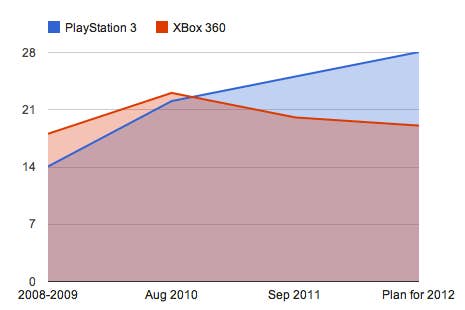Ron Carmel: XBLA is losing "star talent"
2D Boy boss questions Microsoft policy, saying creatives need more control
Ron Carmel of World of Goo developer 2D Boy has question Microsoft's policies for XBLA, saying that the service is losing "star talent" to other platforms because of unnecessary bureaucracy and overly demanding processes.
Developers, Carmel believes, are moving away from the service. Not just that, but, in an extended blog post on 2D Boy's website, Carmel claims that it's some of the brightest and best who are migrating to other platforms.
Carmel used data from a previous survey of 200 indie developers from August 2010, combined with a new survey of the same developers. Around half of the lobbied companies responded, giving Carmel some interesting data.
Previously, Carmel believes, more developers had been working on Microsoft's platform, attracted by what many saw as the more evolved and polished XBL as opposed to PSN. Now, Carmel's data indicates, that trend is reversing, with Carmel predicting a continuing trend of devs moving away from XBLA and more creating games for PSN in the near future.

From Carmel's analysis of the graph: "As you can see, in 2008-2009 Microsoft had more developers making games for XBLA than Sony had for PSN.
"The gap narrowed in 2010, and this year more of these developers are making PSN games than XBLA games. Next year, the number of games this group makes for XBLA will drop again, and PSN's lead will widen as the number of developers making PSN games rise to double what it was in 2008-2009."
The developer then goes on to conduct a relatively interpretive analysis of the companies questioned by the survey and the games they've produced, concluding that the group which were sent questions represent some of the most talented in the business.
Games produced by companies sent the questionnaire had a higher Metacritic and sales rate that the average of game produced by companies not sent the questionnaire, and includes three of the top five selling titles on the service. Because this group is trending towards abandoning XBLA, says Carmel, the service is losing its best talent.
However, Carmel doesn't reveal those statistics for the surveys' respondents, only those who were sent the questions. Given that only half of those issued the survey answered, and that only around 40 of those respondents are in the console space, Carmel's data is far from exhaustive - something Carmel fully appreciates.
"It's important to note that only about half of the developers I sent the survey to responded," he writes. "So while the results do have meaning and suggest certain trends, they are not definitive. I'm open (and wouldn't be shocked) to seeing data that suggests a different trend."
Interpretive skew aside, Carmel does go on to suggest a course of action which Microsoft could follow to prevent this perceived brain drain, listing ten points to improve the service for small developers, split between those needed to survive and those needed to thrive.
Survival:
- 1. Create a fair contract that doesn't require negotiation.
- 2. Solve the content discovery problem.
- 3. Stop requiring independent developers to publish through MGS.
- 4. Drop the TCRs, make updating easy.
- 5. Get rid of the exclusivity requirement for independent developers.
Thriving:
- 1. Drop the greenlight process and open up development to everyone.
- 2. Make every console a dev kit.
- 3. Automate everything.
- 4. Drop the ESRB in favour of a self administered rating system.
- 5. Make avatar related requirements optional.
Whilst Carmel's advice might seem strange in the face of one of XBLA's most critically and commercially successful periods, which gave rise to From Dust, Bastion and Insanely Twisted Shadow Planet, the comments following the article are almost universally in agreement.
Given that those commenters appear to largely be developers themselves, perhaps Microsoft should be paying attention.
